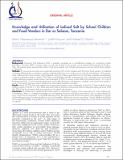| dc.description.abstract | Background:
Universal Salt Iodisation (USI) is globally accepted as a cost-effective strategy for controlling Iodine
Deficiency Disorders (IDD). However, there is a paucity of data on the proper use of iodised salt among food vendors.
Thus, the present study assessed the School food environments and iodised salt practices among school food vendors
in Tanzania.
Methods:
A cross-sectional study was conducted involving 322 school children and 30 school food vendors. A stratified
multistage followed by a systematic random sampling technique was used to recruit schools and children. Salt samples
were collected from food vendors and analyzed using the iodine rapid field test kit and then analyzed quantitatively
using an iodometric titration method. The data on knowledge, attitude, and practices was collected using customized
Iodine deficiency-related questionnaires recommended by FAO to assess iodine deficiency-related factors. For school
food environments, 3 tools were designed and used to get information; the teachers, students, and school food vendors’
tools. A chi-square test was used to establish an association between variables.
Results:
About 76.7% of the salt samples from school food vendors were adequately iodised (≥15 ppm) with the mean
iodine content of 39.26
±
11.06. More than half (70%) of the food sold around school compound were junk food. Half
(63.3%) of the food vendors had poor practices of iodised salt utilisation.
Conclusion:
A substantial achievement has been made in awareness creation of the importance of using iodised salt.
Nonetheless, there is a limited knowledge on salt handling practices including discretionary salt use exacerbated by
poor school food environment. To optimally eliminate IDDs, the government should now place more emphasis on proper
salt handling practices from the production site, food handlers, and much more to consumers. School children should be
encouraged on healthy eating habits, by improving school feeding programs and change the current food environments
in schools | en_US |

